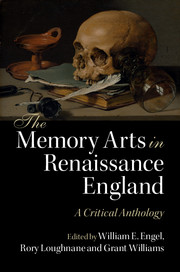Book contents
- Frontmatter
- Dedication
- Contents
- List of figures
- Acknowledgements
- A note on abbreviations
- Introduction
- PART I The art of memory
- PART II Rhetoric and poetics
- Introduction to Part II
- II.1 Anon., Table of Cebes (1531)
- II.2 Thomas Wilson, The Art of Rhetoric (1553)
- II.3 George Puttenham, The Art of English Poesy (1589)
- II.4 Henry Peacham, The Garden of Eloquence (1593)
- II.5 Philip Sidney, The Defence of Poesy (1595)
- II.6 Francis Meres, Palladis tamia (1598)
- II.7 Samuel Daniel, Musophilus (1599)
- II.8 Miles Sandys, Prudence (1634)
- II.9 Ben Jonson, Timber, or, Discoveries (1641)
- II.10 Alexander Ross, Mystagogus poeticus (1648)
- PART III Education and science
- PART IV History and philosophy
- PART V Religion and devotion
- PART VI Literature
- Index
- References
II.6 - Francis Meres, Palladis tamia (1598)
from PART II - Rhetoric and poetics
Published online by Cambridge University Press: 05 August 2016
- Frontmatter
- Dedication
- Contents
- List of figures
- Acknowledgements
- A note on abbreviations
- Introduction
- PART I The art of memory
- PART II Rhetoric and poetics
- Introduction to Part II
- II.1 Anon., Table of Cebes (1531)
- II.2 Thomas Wilson, The Art of Rhetoric (1553)
- II.3 George Puttenham, The Art of English Poesy (1589)
- II.4 Henry Peacham, The Garden of Eloquence (1593)
- II.5 Philip Sidney, The Defence of Poesy (1595)
- II.6 Francis Meres, Palladis tamia (1598)
- II.7 Samuel Daniel, Musophilus (1599)
- II.8 Miles Sandys, Prudence (1634)
- II.9 Ben Jonson, Timber, or, Discoveries (1641)
- II.10 Alexander Ross, Mystagogus poeticus (1648)
- PART III Education and science
- PART IV History and philosophy
- PART V Religion and devotion
- PART VI Literature
- Index
- References
Summary
About the author
Francis Meres (1565–1647), a rector in Rutland who ran the local school, authored one of the first contemporary print sources to mention Shakespeare and list recent plays.
About the text
This is the second part of Politeuphoria, Wit's Commonwealth (1597), an earlier and extremely popular collection of moral sayings gathered from classical authors, anecdotes of famous people and historical epitomes, all arranged by topical headings (attributed to John Bodenham). Meres's version formed the basis of a third augmentation, Robert Allott's Wit's Theatre of the Little World (1599), and a fourth, Wisdom's Palace (1604).
The arts of memory
Meres creates a set of commonplaces drawn from already existing epitomes. Following the precedent set by Aristotle and Cicero, it is organised by topics, such as ‘virtue’, ‘poets’, ‘studies’ and (excerpted here) ‘memory’. The quotations grant mnemonic access points to nuggets of wisdom mined from the usual source texts. These terse cues gave readers exactly what they were looking for in just such a collection. In effect, the book creates a pre-digested memory on paper for those who might not otherwise have had access to this backlog of information.
Textual notes
Francis Meres, Palladis tamia, Wits Treasvry (London, 1598), Ii6v–Ii7v.
Palladis tamia
Memory
As books are consumed with worms that are never looked upon; so memory perisheth except it be renewed. Seneca
Little fishes slip through nets, but great fishes are taken; so small things slip out of memory, when as great matters stay still. Erasmus
As pies have a wonderful desire to imitate the voice of man, so that through extreme endeavour they sometimes kill themselves; so it is marvellous pleasant and delightsome to many to learn by heart problems, songs and sonnets, and to sing them, albeit they understand them not. Conradus Lycosthenes Rubeaquensis
As Lupus Ceruarius, a beast engendered of a hind and a wolf, doth in the time of hunger and famine forget his food if so he see anybody; so from many that presently slip out of memory which they purposed to speak of when as they hear words spoken to another. Plin.lib.8.cap.22
Cast anything into a standing water and circles will arise, which put out one another; so when one thing cometh into the memory, another thing is thrust out, therefore the memory is always to be repaired, that as matter passeth, another may be present.
- Type
- Chapter
- Information
- The Memory Arts in Renaissance EnglandA Critical Anthology, pp. 125 - 127Publisher: Cambridge University PressPrint publication year: 2016



